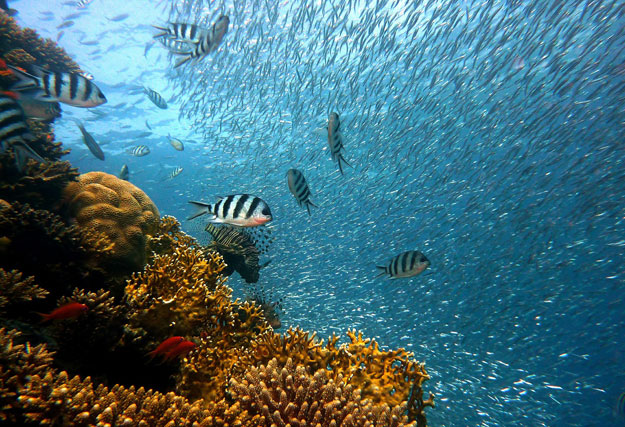
I’m far from a serious student of the philosophy of ethics, but I did pick up one principle a few years ago in passing that has stuck with me. The principle is from Immanuel Kant, and in simplified terms it states that an act is only moral if you would wish all other people to behave the same way (for it to become a “universal law,” in Kant’s words). I don’t apply this to every action in my daily life, but when I’m making a new decision I do often think about what the collective effects would be if everyone in XYZ group did the same thing I did. This is how I formed my general philosophy about waste—just me throwing away one bottle instead of recycling it isn’t a big deal, but if that’s what everyone did, we would have millions more bottles in the landfill. It’s also this philosophy that reminds me that our individual actions make a collective difference.
This week I was checking out a new campaign from the Story of Stuff Project, and I was intrigued by their philosophical approach, which seemed to turn mine on its ear but also made a lot of sense. The campaign is called the Story of Microfibers, and it aims to address the issue of microscopic plastic pollution from synthetic fabrics in oceans and other bodies of water. Here’s their video that provides a general overview of the issue:
While reading their page of proposed solutions to the microfiber crisis, I was caught by this explanation of their approach. After listing several consumer-end solutions like washing machine filters or mesh laundry bags, author Michael O’Heaney states:
…these interventions require universal adoption to work… As our founder Annie Leonard puts it, when it’s hard to figure out how to fix a problem on your own, or the fix is onerous or expensive, that should serve as a sort of metal detector for flaws in the system; it should encourage us to look further upstream for a solution.”
Basically, he’s saying that if the solution to a problem requires the universal adoption of a certain behavior by consumers, that typically indicates the presence of a flaw at a higher level of the system. To me, this makes a lot of sense and addresses the inherent flaw in my default moral structure, which is the fact that my action may be beneficial if multiplied by a hundred or a thousand or a million people, but in all likelihood the majority of other people are likely not willing or able to make the same choice.
For the Story of Stuff, this philosophy led them all the way upstream to clothing manufacturers. Their recommended action is for consumers to call upon apparel companies to invest in research and development for new fabric technologies that will prevent the release of microfibers into the environment.
In the long term, I think this is a fantastic solution. I’m a huge supporter of companies being held responsible for the environmental impacts of their products. However, as an avid secondhand shopper with a tendency to keep my clothes for as long as possible, I’m resistant to the idea of buying an all-new wardrobe made of microfiber-free fabric. (Kant urges me to think of the implications if everyone did this universally!) Plus, it could be years before these new technologies are developed, tested and released into the marketplace. We would be remiss to dismiss the solutions aimed at addressing the microfiber pollution caused by clothing already in circulation. (Side note: Someone please keep #RemissToDismiss in your back pocket as the hashtag for some future social justice campaign.)
These are the consumer-based solutions discussed on the Story of Stuff page:
- Wear and wash synthetic fabrics less often
- Choose clothing made of natural fibers like cotton, linen or hemp
- Use a laundry accessory designed to minimize microfiber pollution, such as the Guppy Friend, soon to be available at Patagonia (I also found another microfiber catcher in development from the Rozalia Project)
- Install a washing machine filter to capture microfibers (such as this one)
In my research I found surprisingly little information about opportunities to support ocean cleanup efforts to reduce the amount of plastic already in the water system. For now the conversation seems to be focused heavily on prevention.
I appreciate the Story of Stuff Project’s strategy for spotting red flags for systemic flaws, and I wouldn’t be surprised if you see me apply that line of thought to more topics in the future. But as I sit here in my cozy fleece jacket made of recycled bottles that will surely release hundreds of thousands of fibers the next time I wash it, unsure of the timeline of technological advancement in fabrics, some degree of consumer-based solution seems necessary to me alongside high-level systemic change. While consumer solutions may have a comparatively low adoption rate and not fully stem the tide of microfiber pollution, they can be a stepping stone that reduces pollution while we wait for more comprehensive industry action.
My final pondering about the microfibers issue is where it will end up ranking in priority with other critical apparel industry improvements, such as ensuring safety and living wages for factory workers. I haven’t seen these issues addressed jointly yet, but hopefully manufacturers will realize the need to take responsibility for the impacts of their products at both the start and end of the lifecycle, and not ignore one in favor of the other.

Thanks for sharing! But omg this is frightening news. I had not thought of this at all! I try really hard to buy clothing made of natural fibers, but ever since we moved from San Diego CA to Seattle WA, we have needed to add some warmer clothing to our wardrobe. We bought merino wool base layers, but wool midlayer and shells are sooo expensive. We bought fleece and other polyester clothing :( I will buy one of those washing machine filters to do my part, but this is sad news indeed.